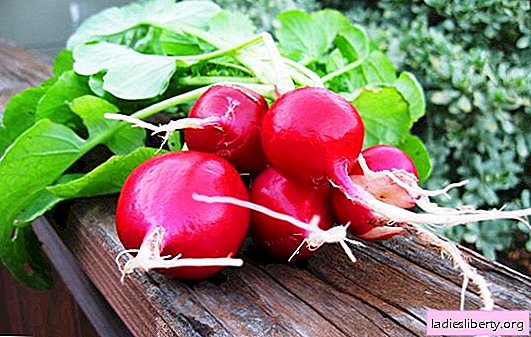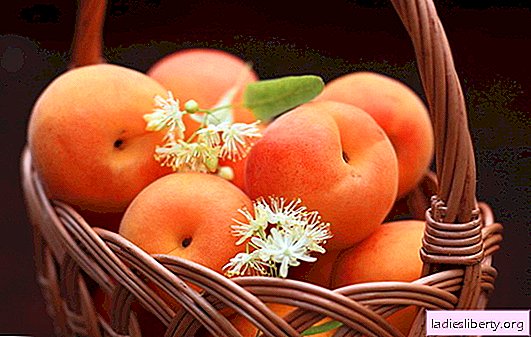
We are used to the fact that radishes are the first to please us in early spring. Its juicy, tart taste is familiar to everyone. However, in addition to taste, it also has useful properties that allow the use of this vegetable in traditional medicine.
What is a radish? Its useful properties, rules for the acquisition and storage
Radish is an annual or biennial plant in the Cabbage family. Grown in many countries. Valued for root crops, which are red, white or dark pink in color with a sharp taste.
From it you can make an excellent vegetable salad, lovers of cold soups add it to okroshka.
When buying, choose solid root crops with smooth skin. If you came across a soft radish, then the vegetable itself will be tasteless.
You can store radishes with tops in the refrigerator for three days, without tops for about 10 days. Also, this vegetable can be pickled and canned. Radish is not subject to freezing, it is better to use it only in fresh form.
Calorie content of radishes is 20 kcal per 100 grams of product.
Useful properties of radishes
Radish root vegetables contain a large amount of vitamins and minerals, just like the tops of vegetables. In folk medicine, juice is most often used. They use it in a diluted form, since in its pure form it can cause pain in the stomach and irritation of the oral mucosa.
Radish contains protein, fiber, pectin, essential and mustard oil, as well as vitamins B1, B2, B5, PP, calcium, sodium, magnesium, phosphorus and iron.
The energy value of the product is:
• proteins - 24%
• fats - 5%
• carbohydrates - 68%
Interesting to know, that this vegetable is not inferior to citrus in terms of vitamin C content, its potassium content is the same as in cabbage, but pectin substances are much more than in other vegetables.
Each of the components of this plant has its own beneficial qualities for the human body.
• C (ascorbic acid) - 25 mg. This vitamin is involved in almost all areas of the human body. It contributes to the normal functioning of connective and bone tissue, its regeneration, participates in redox processes, in carbohydrate metabolism. It has the ability to strengthen the immune system and protect the body from infections. Able to reduce vascular permeability.
• B5 (pantothenic acid) - its content is small (0.2 mg), but it performs its function of protecting the body from the harmful effects of many factors.
Much more radish contains minerals. And first of all it:
• Vanadium (185 mcg) - helps with energy production, metabolism of fats and carbohydrates. Helps reduce the production of bad cholesterol and normalize the functioning of the nervous system. It is an excellent means of working the nervous system. Therefore, vanadium has a beneficial effect in the treatment of cardiovascular diseases and atherosclerosis.
• Copper (225 g). This element, due to its properties, helps the body convert iron into hemoglobin, which is vital for the human body. He is involved in hematopoietic processes. Copper also promotes collagen synthesis and bone strengthening. She is also responsible for the proper formation of blood vessels.
• Boron (100 mcg) - affects growth, and also provides the body's resistance to various kinds of diseases.
• Iodine (150 mcg) - the best element that has a beneficial effect on the functioning of the human thyroid gland and its hormonal background. With insufficient iodine in the body, the processes of growth and development slow down.
Medicinal value and useful properties of radish
The use of radishes as a therapeutic source is fully justified. Its main useful properties include the following:
1. Saturation of the body with vitamins during the fight against winter hypovitaminosis.
2. This is a source of coarse fibers, fiber, which fully fills our digestive organs.
3. Radish juice is successfully used for the first symptoms of a cold.
4. The rafapine which is a part is an excellent antimicrobic agent.
5. Promotes improvement of digestion, stimulation of appetite, thanks to essential mustard oils which are a part. Such oil is found in the skin of the product.
6. The pectin which is a part eliminates various slags and other harmful substances
7. Promotes the removal of fluid from the body by enhancing filtration in the kidneys.
8.Is an excellent laxative. Promotes better peristalsis and bowel movement.
9. The substances contained in the radish help stabilize blood sugar levels.
10. Has the ability to lower blood pressure.
11. Struggles with chronic arterial disease, which can lead to coronary heart disease.
12. The enormous amount of saliva that comes from eating radishes actually rinses your mouth, washing off germs and food debris.
Radish is also used in cosmetology. Its internal use leads to an improvement in complexion. You can also use an external nourishing face mask. To do this, grate 1-2 pieces of this root crop, mix with 0.5 tsp. vegetable oil and add 1 tsp. starch. Put the resulting mixture on the face and leave for 10 minutes. Then rinse with warm water.
Use of the beneficial properties of radish in folk medicine. Recipes
• At the first symptoms of a cold, prepare a tincture of radish juice with honey.
• If you are tormented by back pain, then use a compress that consists of a radish grated on a coarse grater. Wrap the mixture in gauze and attach to a sore spot.
• For constipation, use the infusion of radish tops. To do this, fill in 1 tbsp. l tops with a glass of boiling water and let it brew for an hour. Drink for several days 20 minutes after eating.
• For sore throats, rinse your mouth with a mixture of radish juice and water in a ratio of 1: 1. To accelerate the effect, take the same mixture inside.
Radish for children: only good?
Basically, children are not enthusiastic about this vegetable. They don't quite like its slightly mustard taste. But this does not negate its useful properties. It is recommended to introduce a radish into the children's diet after 1.5 years. This is due to the fact that it contains essential oils, which can cause an allergic reaction. Keep track of the individual tolerance of such a product by the child. Also, sometimes the child may experience bloating and colic.
Despite the huge number of useful properties, radish can have a harmful effect on the body. It is not recommended to use it for people who have:
- thyroid disease,
- an ulcer;
gastritis
renal disease
- liver disease
- violation of uric acid metabolism (gout).
As you can see, radish and all its components are very often used in folk medicine. However, do not forget that any alternative recipes will not replace qualified medical care.











